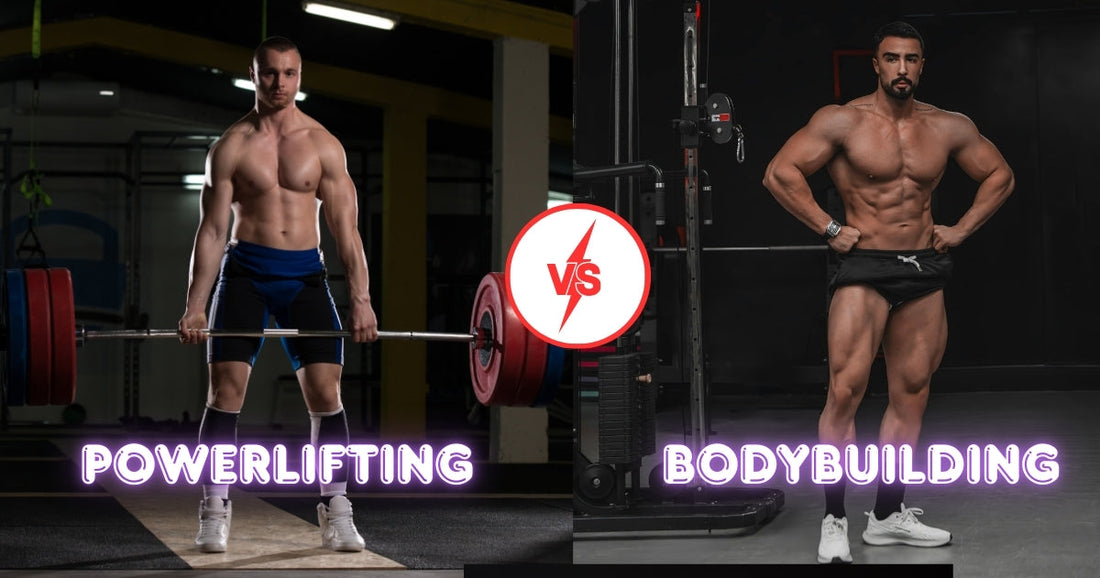
Powerlifting vs Bodybuilding: Which One Is Right for You?
Share
If you've ever been to a gym, you’ve probably seen two guys working out, one lifting a heavy barbell for a single rep and the other doing bicep curls while checking himself out in the mirror. This is a clear example of powerlifting and bodybuilding in action.
Both involve lifting weights and building muscle, but they have different goals, training styles, and results. Whether you're just starting out or you're curious, this guide will explain everything you need to know.
1. The Main Goal
The biggest difference between powerlifting and bodybuilding is their purpose.
Powerlifting: Powerlifting focuses on strength. The goal is clear: lift as much weight as you can in three lifts: the squat, bench press, and deadlift. Competitions judge you based on how much weight you can lift.
Bodybuilding: On the other hand, bodybuilding is about looks. The goal is to build a well-balanced, muscular, and symmetrical body. In competitions, judges assess your muscle size, shape, definition, and how you present yourself.
2. Training Style
Both powerlifting and bodybuilding involve heavy weight training, but their training styles are different.
Powerlifting:
-
Focuses on lifting heavy weights for fewer reps.
-
Workouts mainly center around the three main lifts: squat, bench press, and deadlift.
-
The goal is to get stronger over time.
-
Athletes take longer breaks between sets (2–5 minutes).
-
They do some extra exercises, but these mainly support the main lifts.
Bodybuilding:
-
Focuses on more reps with moderate to heavy weights.
-
Aims to grow muscles (hypertrophy).
-
Includes many exercises that target specific muscles.
-
Rest periods are shorter (30–90 seconds) to keep the muscles under tension.
-
Uses split routines (like chest day or leg day) to work different muscle groups.
3. Diet and Nutrition
What you eat plays a big role in your performance and body shape in both sports.
Powerlifters:
-
Powerlifters focus on performance and recovery.
-
They eat more calories to support heavy lifting.
-
Carbs give them energy, while protein helps with recovery.
-
They don’t worry much about staying very lean all year.
Bodybuilders:
-
Bodybuilders follow stricter diets, especially before competitions.
-
They focus on controlling carbs, protein, and fats to gain muscle or lose fat.
-
They go through "cutting" (losing fat) and "bulking" (gaining muscle) phases.
-
Their goal is to keep body fat low, especially before shows.
4. Physique and Aesthetic Differences
You can often tell the difference between a powerlifter and a bodybuilder just by looking.
-
Powerlifters: Powerlifters usually have a thicker, more rugged build. While they may not be super lean, they have dense muscles focused on strength.
-
Bodybuilders: On the other hand, bodybuilders have very defined and symmetrical muscles with low body fat. You’ll often see visible abs, vascular arms, and polished posing.
5. Injury Risk and Recovery
Lifting heavy or training hard always carries some risk.
-
Powerlifters often put stress on their joints and tendons from lifting extremely heavy weights. The lower back, shoulders, and knees are common problem areas.
-
Bodybuilders, on the other hand, may face overuse injuries, especially in smaller joints and tendons due to repetitive movements.
The Role of Supplements in Both Sports
Nutrition plays a huge role in your success, whether you're lifting for strength or size. While whole foods should be the foundation of your diet, supplements can help fill the gaps, especially when training gets more intense.
If you're aiming to boost recovery, strength, and muscle growth, using the right workout supplements for Athletes can make a big difference. These supplements often include key ingredients like protein, creatine, amino acids, and pre-workouts, all of which support performance and results.
The needs can vary a bit:
-
Powerlifters often prioritize creatine, joint support, and carbs during workouts.
-
Bodybuilders usually focus on protein powders, BCAAs, and fat burners, especially during cutting phases.
Choosing the right supplements for your training style can give you an edge, particularly during intense training cycles or contest prep.
Which Is Better?
There’s no one-size-fits-all answer—it depends on your goals.
-
If you want to be as strong as possible, powerlifting is the way to go.
-
If your goal is to look muscular and defined, bodybuilding might be a better choice.
Interestingly, many athletes mix both. Powerlifters might do bodybuilding-style accessory work to avoid imbalances, while bodybuilders may train with heavy, low-rep lifts to build strength.
Bottom Line
Powerlifting and bodybuilding both lead to great results but focus on different goals. Powerlifting is about strength, while bodybuilding is about muscle shape and appearance. There’s no right or wrong choice, just pick what fits your goals. Stay consistent, eat well, and train smart. Enjoy the journey!
